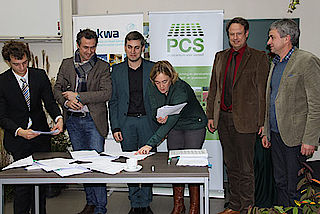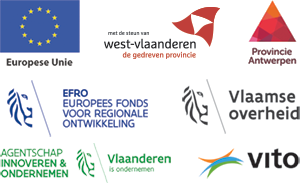FOSCAP - Phosphate reduction in greenhouse effluent of horticultural businesses by innovative phosphate capture

FOSCAP will demonstrate an inexpensive but effective way to remove phosphates from greenhouse effluents to the horticulture industry. This treatment will be done before being discharged into surface waters (in case water reuse or spreading on grassland is not an option). Companies must have a permit to discharge and meet the discharge requirements. Solutions to achieve the discharge standards for nitrate have already been identified, but for the removal of phosphorus from wastewater a sustainable solution is not yet available.
FOSCAP introduces a technically simple technique for the capture of phosphate which is based on the chemical binding of phosphates to IOCS (Iron oxide coated sand or iron beads with a sand core) or granules of semi-solid iron sludge. Both filter materials are by-products of de-ironing for drinking water production and are supplied by drinking water company ‘PIDPA’. Two horticulture companies, ‘ID'Flor’ (azalea) and floriculture ‘Meuninck’ (plants), will test this innovative technology with IOCS in their company. Since wastewater with a high concentration of phosphorus is also a relevant issue in many other sectors (e.g. greenhouse vegetables, dairy farms, slaughterhouses, …), the technology provider ‘PCA’ will evaluate the possibility to integrate the phosphate filter in existing water treatment systems that are being used in these different sectors. ‘PCS’ will compare the both and will demonstrate a complete solution for the discharge of greenhouse effluent (= constructed wetland for N-capture followed by a phosphate filter).
Measurements of the phosphate concentration in greenhouse effluent before and after the filter allows to evaluate objectively the phosphate capture in every demo lineup, and to control if the concentration effectively drops under de discharge standard of 1 mg/l phosphate phosphor. In the summer of 2015, interested parties will be able to see the filter effectively working on both horticulture companies and at ‘PCS’.
Companies that have submitted this project:
· ‘ID’Flor’ is a Belgian production company of potted plants and started up in 1954. It consists of 4 company establishments with a total production area of 20 ha. The establishment Moerbeke (4 hectares of greenhouses and 4 hectares of open area) cultivates exclusively azaleas. ‘ID’Flor Moerbeke’ recycles all drain water. Only the effluent from the backwash of the rapid sand filter and occasionally unusable drainage water (by up concentration of salts or plant growth regulators) are being discharged through a discharge permit. The FOSCAP filter will reduce the phosphorus content for discharge. www.idflor.com
· ‘Floristry Meuninck’ is a horticultural farm with 4,3 ha greenhouses where warm greenhouse plants are cultivated (Microsorum, Dieffenbachia, Chlorophytum, Aglaonema and Schefflera). Because the installation of a disinfection system is not feasible, the reuse of drainage water cannot be considered due to the risk of spreading plant pathogens. Therefore, drainage water is spread in an environmentally responsible way on pasture. By reducing the phosphorus content in this drainage water, a large volume can be disposed.
· ‘PCA’ is a provider of various technologies in the field of water treatment and water purification. ‘PCA’ offers installations from A to Z: problem analysis, design, construction, start-up, follow- up and maintenance. ‘PCA’ has its own automation department and workshop for the construction of electrical cabinets and plastic constructions. For ‘PCA’ the phosphorus filter can be an interesting addition to the techniques already offered. www.pcawater.com
The knowledge center involved in the project is ‘Proefcentrum voor Sierteelt (PCS)’ and ‘K.U. Leuven’.
